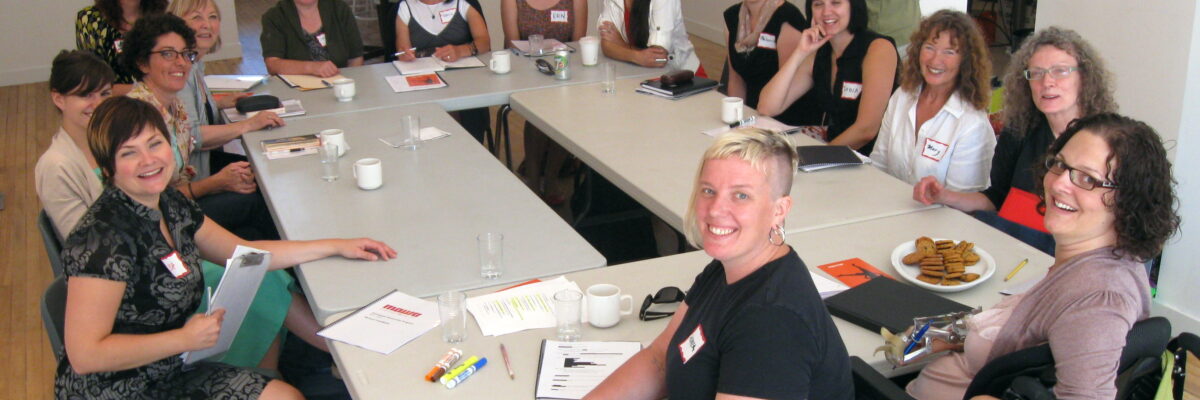Setting Up A Mentorship Program

The 2011/2012 Foundation Mentorship Program at MAWA
Getting started
When planning a mentorship, begin by deciding upon the parameters (how many contact hours over what duration) and application process. There are many models.
MAWA begins by hiring the mentor(s). The program is then advertised, stating who the mentor(s) will be. MAWA receives applications, but the mentors decide who they would like to work with, based on whose practice they feel they can move forward.
At CARFAC Saskatchewan, there is a different format. Mentees are selected, and then CARFAC finds them an appropriate mentor.
A third model is MAWA’s One-on-One Mentorships, in which a mentee approaches a mentor of their choice. If the mentor is willing to work with them, they can apply together to the program.
Whatever the process, a strong match between mentor and mentee (personality, conceptual concerns and/or medium) is key. In MAWA’s experience, when matches are forced, the mentorship is often less successful. Both parties must feel comfortable and energized with the pairing. An interview process can help establish mentor/mentee compatibility. See the sample questions or download the Word document.
Some mentorship programs include group meetings (of all of the mentees and mentors together) as well as individual meetings (one-on-one meetings between mentors and their mentees.) Group meetings can broaden the conversation, build community and cover material of interest to all.
MAWA takes mentoring seriously; it is a commitment. As such, MAWA mentors are compensated between $35 and $100/hour depending on the program. This values the labour and expertise of artists, and creates accountability. The mentors must show up. It is a job. See the sample year-long contract (PDF) or download the Word document.
“The greatest way that mentorship has affected my life is in the affirmation that my voice is important.”
– Megan Krause
Selecting mentors
Traits of an excellent mentor include:
- a high level of skills and professional experience
- desire and ability to share what they know
- up-to-date knowledge
- commitment to devoting time and energy to the mentee
- the ability to communicate and listen effectively
- a sense of humour
- respectfulness, particularly of differences
- trustworthiness
- flexibility
- a willingness to learn from the mentee
Mentors often have had positive mentoring experiences (experience with being mentored themselves). See MAWA's mentor selection guidelines or download the Word document.
Selecting mentees
Different programs will have different selection criteria. MAWA’s application requirements change, depending upon the program. See examples.
At MAWA, mentees are selected on the basis of the strength of their work, their willingness to devote time and energy to the mentorship, and an openness to learning and growth. Artists of all ages and educational backgrounds are eligible, however students are not. An arts mentorship requires independence, self-motivation and an artistic practice that is rooted in a distinct artist "voice" as opposed to assignments. See MAWA mentee selection guidelines or download the Word document.
MAWA charges mentees between $75-$300 for each mentorship program.
A sample program
MAWA’s Foundation Mentorship Program has operated continuously since 1985. To see a sample structure of an established mentorship program, see the Foundation Mentorship Program summary or download the Word document.
Impact of mentorship
Program evaluation
A scheduled, confidential, mid-point evaluation during a mentorship can help to address problems and keep the mentorship on track. Confidential final reports at the conclusion of a mentorship can inform structural changes that improve the program going forward. It is important to ask each party (mentor and mentee) to evaluate the experience and the mentee’s professional growth independently.
Questions asked of the mentor and mentee may include:
- What were the main goals of the mentorship and how did they develop?
- Was this a valuable program for the mentee?
- What were the successes of the mentorship (growth)?
- What were the challenges?
- What were some of the lessons or strategies that the mentee learned through the program?
- What resources were the mentee introduced to?
- What was your meeting schedule (how often and when did you meet)?
- How could the program be improved?
- Do you have suggestions for future programs?

